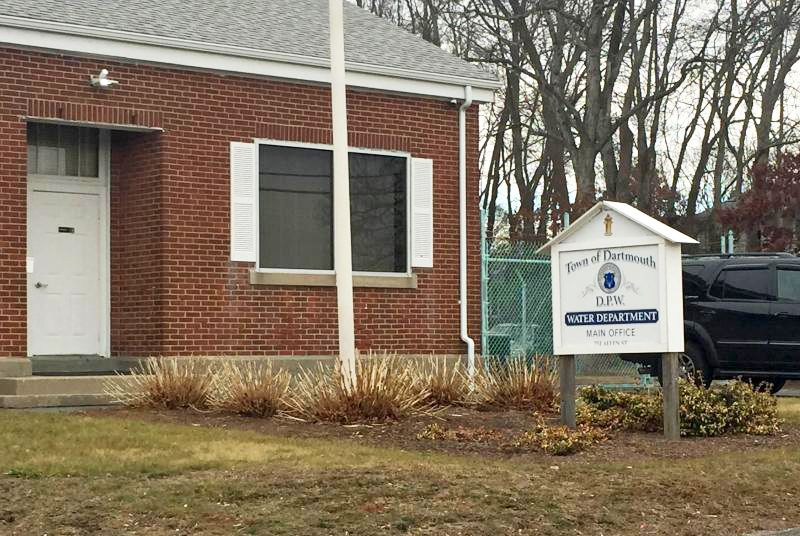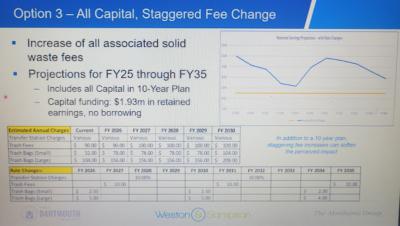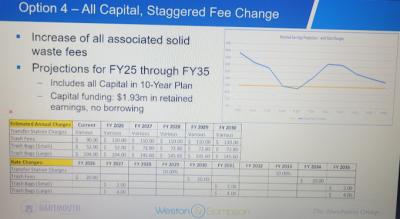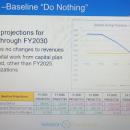Annual trash and trash bag rates to increase
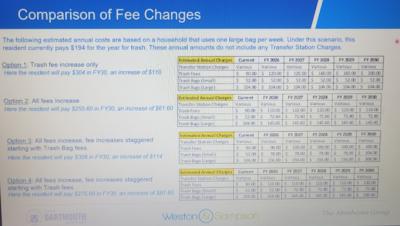
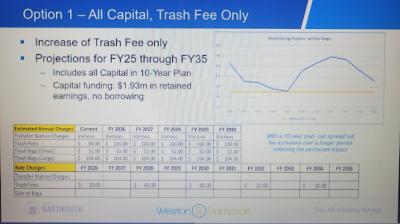
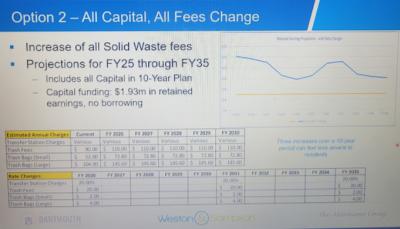
Dartmouth’s annual trash and trash bag rates will be gradually increasing starting in Fiscal Year 2026, but by how much is still unknown.
At the Board of Public Works meeting on Thursday, Nov. 21, representatives from planning firms Weston & Sampson and the Abrahams Group presented the preliminary findings from phase two of the Department of Public Works’ efficiency study.
The two-phase efficiency study, which determined how much the department needed to increase water and sewer rates in phase one, looked at the sanitation division in phase two.
The division is looking at a 10-year window to maintain capital costs and retain earnings at or greater than 15%, said Weston & Sampson representative Ben Rollin.
In addition to operational and capital costs, the study also focused on a way to keep the town of Dartmouth’s trash rates low compared to similar communities, Rollin said.
Matthew Abrahams, a representative from the Abrahams Group, presented four options to meet these goals during the Board of Public Works meeting.
The town of Dartmouth maintains a capital plan for projects related to solid waste and has multiple projects planned for the future that would cost just under $2 million, said Abrahams Group representative Matthew Abrahams.
Abrahams presented four options to meet the goals outlined in the efficiency study and also fund the capital projects without having to borrow money.
The fees considered in each option are the annual trash fee, the fees of small and large trash bags and transfer station charges.
The prices in all four options run under the assumption that an individual household is using just one trash bag each week.
While the four options include transfer station charges, they don’t include specific values because the fees people pay when they bring trash to the stations can vary, Abrahams said.
Each option also assumes full capital funding for the capital items.
In the first option, residents would see an increase in the annual trash fee, which is currently $90. This fee would increase incrementally every two fiscal years and by 2030 will cost $200 annually.
Since the annual costs of small and large trash bags would not increase in this option, residents would see a total increase of $110 by 2030.
Option two would increase the annual trash fee and the trash bag fees in fiscal year 2026.
The trash fee would increase from the current $90 to $110, the fee for small trash bags would increase from $52 to $72.80 and the fee for large trash bags would increase from $104 annually to $145.60.
The third option would increase both the trash and bag fees, but they would change in a staggered fashion.
Trash fees would change in fiscal year 2027 to $100. The small and large bag fees would change in fiscal year 2026 to $78 and $104 respectively and again in 2030 to $156 and $208 respectively.
This option would see a total increase of $114 for residents using one large trash bag per week.
The final option would also take a staggered approach to increase both the trash and the bag fees.
The trash fee would increase to $110 in fiscal year 2026 then change to $130 in 2030. The prices of small and large bags would increase in fiscal year 2027 to $72.80 and $145.60 respectively and remain at these prices.
Director of Public Works Tim Barber and his staff will also come up with a few alternative rate options for the Board of Public Works to consider implementing.
While the division would be able to operate for a few years without increasing revenue, it wouldn’t be possible for funds to continue to operate at their current levels or sufficiently fund capital, Abrahams said.
He added, “There is a need to increase revenues in the short term.”



